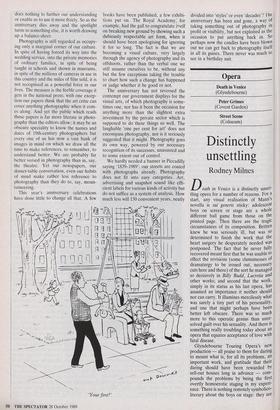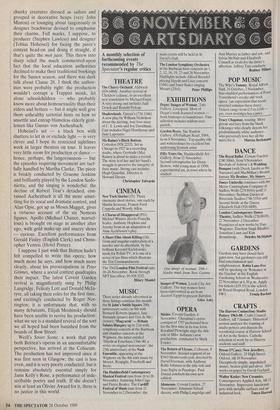Opera
Death in Venice (Glyndebourne) Death in Venice (Glyndebourne) Street Scene (Coliseum)
Distinctly unsettling
Rodney Milnes
Death in Venice is a distinctly unset- tling opera for a number of reasons. For a start, any visual realisation of Mann's novella is sui generis sticky: adolescent boys on screen or stage are a whole different ball game from those on the printed page. Then there are the tragic circumstances of its composition. Britten knew he was seriously ill, but was so determined to finish the work that the heart surgery he desperately needed was postponed. The fact that he never fully recovered meant first that he was unable to effect the revisions (some clumsinesses of dramaturgy to be ironed out, necessary cuts here and there) of the sort he managed so decisively in Billy Budd, Lucretia and other works; and second that the work, simply in its status as his last opera, has assumed an importance it neither should nor can carry. It illumines mercilessly what was surely a tiny part of his personality, and one that might perhaps have been better left obscure. There was so much more to this operatic genius than unre- solved guilt over his sexuality. And there is something really troubling today about an opera that equates acceptance of love with fatal disease.
Glyndeboume Touring Opera's new production — all praise to them for daring to mount what is, for all its problems, an important work, and gratitude that their daring should have been rewarded by sell-out houses long in advance — com- pounds the problems by being the first overtly homoerotic staging in my experi- ence. There is nothing remotely symbolico- literary about the boys on stage: they are chunky creatures dressed as sailors and grouped in decorative heaps (very John Minton) or lounging about langorously in designer beachwear devised to emphasise their charms. Full marks, I suppose, to producer (Stephen Lawless) and designer (Tobias Hoheisel) for facing the piece's content head-on and doing it straight, if that's quite the mot juste. This threw into sharp relief the much commented-upon fact that the local education authorities declined to make their traditional bookings for the Sussex season, and there was dark talk about Clause 28. I think the author- ities were probably right: the production wouldn't corrupt a Trappist monk, let alone schoolchildren — who probably know more about homosexuality than their elders and betters — but it might well give them unhealthy sartorial hints on how to unsettle and entrap blameless elderly gent- lemen like Gustav von Aschenbach.
Hoheisel's set — a black box with shutters to let in or exclude light — is very clever and I hope its restricted sightlines work in larger theatres on tour. It leaves very little room for production or dance hence, perhaps, the langorousness — but the episodes requiring movement are tact- fully handled by Martha Clarke. The piece is briskly conducted by Graeme Jenkins and brilliantly played by the London Sinfo- nietta, and the singing is wonderful: the decline of Robert Tear's detached, con- tained Aschenbach is all the more unset- tling for its vocal and dramatic control, and Alan Opie, got up as Moses Maggot, gives a virtuoso account of the six Nemesis figures. Apollo (Michael Chance, marvel- lous) is brought on stage as another alter ego, with gold make-up and snazzy shoes — curious. Excellent performances from Gerald Finley (English Clerk) and Christ- opher Ventris (Hotel Porter).
I suppose I just wish that Britten hadn't felt compelled to write this opera; how much more he says, and how much more clearly, about his preoccupations in Peter Grimes, where a social context quadruples their impact. The latest Covent Garden revival is magnificently sung by Philip Langridge, Felicity Lott and Donald McIn- tyre, all taking their roles for the first time, and excitingly conducted by Roger Nor- rington; it is unfortunate that, with so many debutants, Elijah Moshinsky should have been unable to revive his production: what we see is a standard revival of the sort we all hoped had been banished from the boards of Bow Street.
Weill's Street Scene, a work that puts both Britten's operas in an uncomfortable perspective, has arrived at the Coliseum. The production has not improved since it was first seen in Glasgow; the cast is less even, and it is very poorly conducted, but it remains absolutely essential simply for Janis Kelly's Rose, a performance of inde- scribable poetry and truth. If she doesn't win at least an Olivier Award for it, there is no justice in this world.



































































 Previous page
Previous page